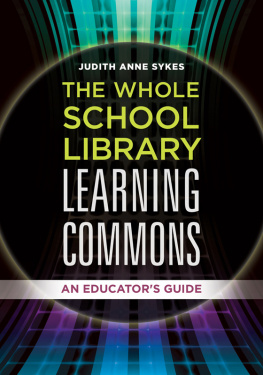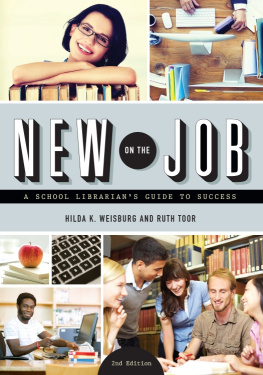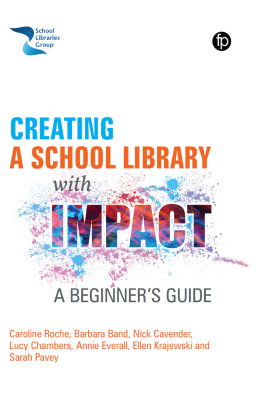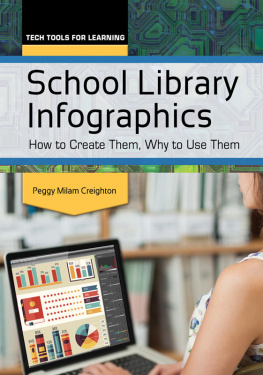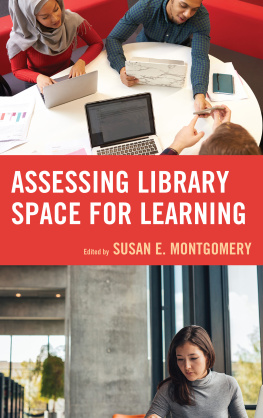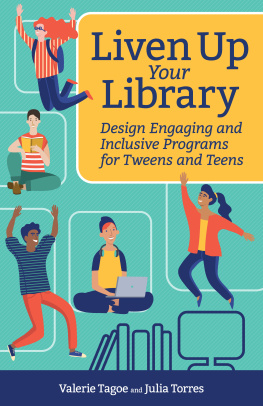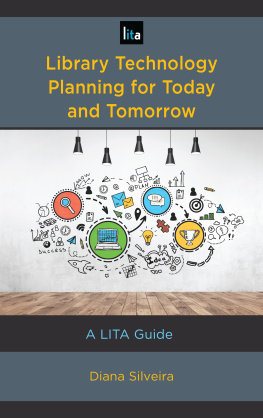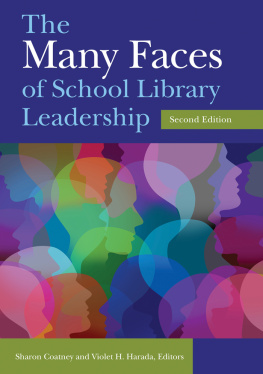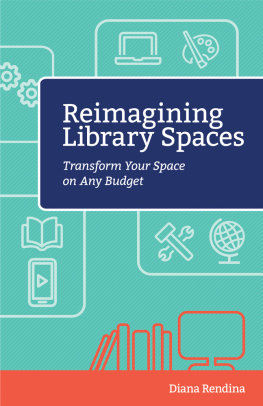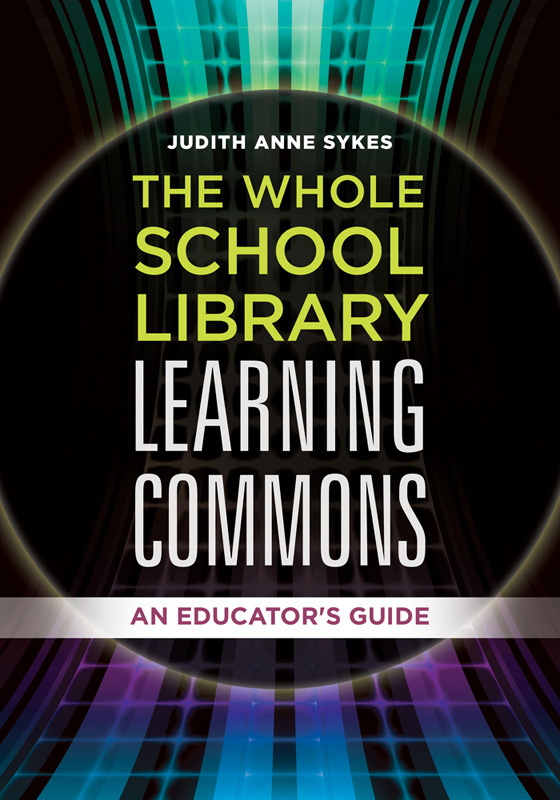The Whole School Library
Learning Commons
Copyright 2016 by Judith Anne Sykes
All rights reserved. No part of this publication may be reproduced, stored in a retrieval system, or transmitted, in any form or by any means, electronic, mechanical, photocopying, recording, or otherwise, except for the inclusion of brief quotations in a review, without prior permission in writing from the publisher.
Library of Congress Cataloging-in-Publication Data
Names: Sykes, Judith A., 1957 author.
Title: The whole school library learning commons : an educators guide / Judith Anne Sykes.
Description: Santa Barbara, CA : Libraries Unlimited, [2016] | Includes bibliographical references and index.
Identifiers: LCCN 2016013111 (print) | LCCN 2016032581 (ebook) | ISBN 9781440844201 (paperback) | ISBN 9781440844218 (ebook)
Subjects: LCSH: School librariesAims and objectives. | Information commons. | Professional learning communities. | School librarian participation in curriculum planning. | Teacher-librarians. | Teaching teams. | Mentoring in education. | Educational accountability. | Action research in education. | School librariesCanadaCase studies.
Classification: LCC Z675.S3 S957 2016 (print) | LCC Z675.S3 (ebook) | DDC 025.1/978dc23
LC record available at https://lccn.loc.gov/2016013111
ISBN: 978-1-4408-4420-1
EISBN: 978-1-4408-4421-8
201918171612345
This book is also available as an eBook.
Libraries Unlimited
An Imprint of ABC-CLIO, LLC
ABC-CLIO, LLC
130 Cremona Drive, P.O. Box 1911
Santa Barbara, California 93116-1911
www.abc-clio.com
This book is printed on acid-free paper 
Manufactured in the United States of America
To Whole School Library Learning Commons Teams everywhere.
And to Bob, Michelle, Billy, Joey, and Oscar.
CONTENTS
David V. Loertscher
The idea of the learning commons, not yet quite a decade old, was to transform the idea of a school library stocked with resources repository into a vibrant and central component of teaching and learning in the school community. Thus, the name change to focus on learning and its participatory community idea centered in commons. For most schools, the stereotypical notion of a circulating book collection has been difficult to transform and continues to resist any other function even in the drastic change in the world of information and technology. Some have interpreted the idea of the learning commons as a simple rearrangement of furniture in an existing physical facility or just adding a few computers to the mix.
In her current book, Judith Sykes, who has worked a great deal on the concept and contributed much to its success, advocates not just a single room or space in the school but a transformation of the entire school both in the physical and the virtual sense. She recognizes the power of a vibrant learning community that takes advantage of information and technology in all its forms and recognizes that children and teens now live in a very different world than the previous generation and must be prepared to compete globally in what they know and are able to do.
This book is not for the beginner. Rather, it is for administrators, department heads, teachers, librarians, and parents who may have been introduced to the idea but may be struggling to expand the concept and its impact throughout the school. Readers of this work will be introduced to the idea of the learning commons as the extension of each classroom, the cross-classroom connection, and the center of active learning that extends beyond the school.
Before reading this work, readers should digest the recent Canadian standards, Leading Learning: Standards of Practice for School Library Learning Commons in Canada (Canadian Library Association [CLA], 2014b), development coordinated by Judith Sykes and Carol Koechlin for CLA. Then as a group of leaders in the school, use this book with its very practical planning guides and recommendations to develop a vision for a whole school learning commons and carry it out. Such an effort transforms a static entity into an incredible active learning opportunity for everyone.
Teachers begin to feel that they are not alone in the isolated classroom pushing mastery enough to pass tests. Parents begin to realize that their children are not just filling assignments but are involved in real and challenging experiences that give them a much clearer vision of their potential in a changed world. Gradually, administrators are able to articulate and demonstrate what a whole school learning community looks like, feels like, and a whole that is much greater than the sum of a bunch of parts pieced together.
Judith has crossed international borders in her writing in a good way that suggests to the reader how differing systems and cultures can embrace the distinctive environment of a learning commons. We can explore differing perspectives as we create our own vision of a learning commons environment for a particular school. The best perspective here is that it takes many heads in the school, not just a single person, to think, experiment, and create an entirely different learning environment. This book sends the reader to a host of resources to use and strategies to build and create a fascinating and exemplary learning community. Congratulations, Judith!
David V. Loertscher
Dear Educator,
Do you like to collaborate on an innovative learning approach that involves you and your students in deep thinking and learning of curriculum, knowledge building, collaboration, success, and enjoyment? Have you heard about achieving this through expanding the pedagogical practices of your school library program into a whole school learning commons? This book is a guide, informing you about the pedagogical shift occurring as school libraries move towards a learning commons approach, and how to implement and sustain the approach to impact student learning success.
After completing a book focused on site-based action research to examine school library programs (Sykes, 2013), I served as project coordinator and contributing writer for new school library standards for the Canadian Library Association (CLA). This involved engaging committees across the country whose members represented an ideal school library learning commons steering team. The result, Leading Learning: Standards of Practice for School Library Learning Commons in Canada (Canadian Library Association, 2014b), was launched at Treasure Mountain Canada 3 (Treasure Mountain Canada, 2016), an extension of United States Treasure Mountain Research Retreats developed by David Loertscher and colleagues in 1989 to focus on school library research as a valuable catalyst for school improvement, based on contributions and analysis of research in the field (Loertscher, 2015c).
These new Canadian standards are not a revision of former standards, Achieving Information Literacy, Standards for School Library Programs in Canada (Asselin et al., 2003), supported and published by CLA and a seminal reference on its own, but provide a new digital format focused on changing landscapes in education and the entire library community, centered on the school library learning commons philosophy as a whole school pedagogical culture. Thinking about how such standards are implemented and sustained throughout schools, I contributed an article to TMC3, where I consider implementing and sustaining a whole school library learning commons through the developmental concepts of mentoring, accountability, research, and community (Sykes, 2014).

